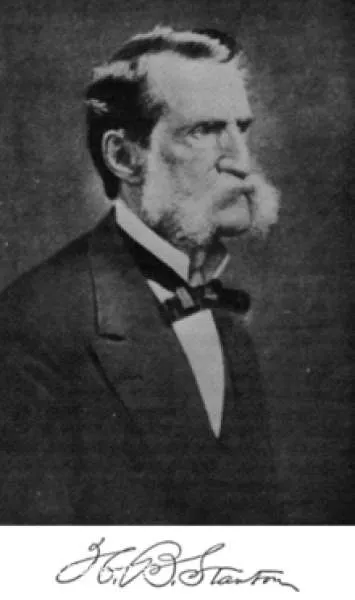
Timeline
Title
Country/Nationality
Henry Stanton
Henry Brewster Stanton was an American abolitionist, social reformer, attorney, journalist and politician. His writing was published in the New York Tribune, the New York Sun, and William Lloyd Garrison's Anti-Slavery Standard and The Liberator. He was elected to the New York State Senate in 1850 and 1851. His wife, Elizabeth Cady Stanton, was a world renowned leading figure of the early women's rights movement.
Stanton was born on June 27, 1805 in Preston, Connecticut, the son of Joseph Stanton and Susan M. Brewster. His father manufactured woolen goods and traded with the West Indies. He remembered his first desires for racial justice dated from his childhood, as he listened to a slave sing:
In my childhood we had a Negro slave whose voice was attuned to the sweetest cadence. Many a time did she lull me to slumber by singing this touching lament [the song of Miantonomi]. It sank deep into my breast, and moulded my advancing years. Before I reached manhood I resolved that I would become the champion of the oppressed colored races of my country.
Stanton became well known as an orator and writer, and used these skills as a journalist, attorney, and politician. In 1826, Stanton began writing for the Monroe Telegraph in Rochester, New York. It was owned by Thurlow Weed and was then promoting the presidential candidacy of Henry Clay. He began to make political speeches. Stanton also wrote for the New York Tribune, when Horace Greeley was editor, and then for the New York Sun until his death. He contributed to William Lloyd Garrison's Anti-Slavery Standard and The Liberator.
He began studying at the Oneida Institute, but was part of a group of 24 who left in 1832 for Cincinnati, Ohio, there to study theology at Lane Seminary. However, Stanton chose to start working in the abolitionist movement before completing his studies. After his marriage, Stanton studied law under his father-in-law Daniel Cady in Johnstown, New York. After passing the bar, he became a patent attorney in Boston, Massachusetts. Both he and his wife were actively and prominently engaged in the anti-slavery movement.
Due chiefly to Stanton's ill health, the family moved to Seneca Falls, New York, in 1847, where they resided in a house which Daniel Cady purchased for them. In Seneca Falls, Stanton continued his work in reform, journalism, and politics, often traveling, speaking, and writing on behalf of abolition. While living in Seneca Falls, Stanton helped organize the Free Soil Party (1848) and the Republican Party in 1856. He was elected as a member of the New York State Senate (25th D.) in 1850 and 1851.
Stanton was widely recognized as a premier American orator on social issues, and he was a primary spokesman for the abolitionist movement prior to the American Civil War. He was known for his skill in extemporaneous speaking. His wife reported that he was occasionally asked to speak on a random topic for the amusement of the audience.
After attending the first World Anti-Slavery Convention in London in 1840, Stanton spent several months on an anti-slavery European speaking tour, touring most of the principal cities of England, Scotland, Ireland, and France. Throughout their lives, Henry Stanton and Elizabeth Cady Stanton traveled widely, both jointly and separately, speaking and organizing for social causes that included temperance, abolition and women's rights. When Henry died unexpectedly of pneumonia in 1887, Elizabeth was in London speaking on behalf of voting rights for women.
His wife, Elizabeth Cady Stanton, cousin of Gerrit Smith, became very much involved in progressive social issues. She worked for temperance, the abolition of slavery, women's rights and universal suffrage. The couple was married on May 1, 1840 and their wedding trip was spent in Europe where Henry B. Stanton was a delegate to the World's Anti-Slavery Convention in London that began on June 12, 1840.
Stanton died from pneumonia on January 14, 1887, election night, while it was pouring rain in New York City.
Books by Henry Stanton

Sex: Avoided Subjects Discussed in Plain English
Henry Stanton was appalled at the shocking lack of information given to young people about sex and reproduction in his time. He felt this was a crime that needed to be fixed and so he wrote this book explaining sex for young and old. Ignorance of bas...